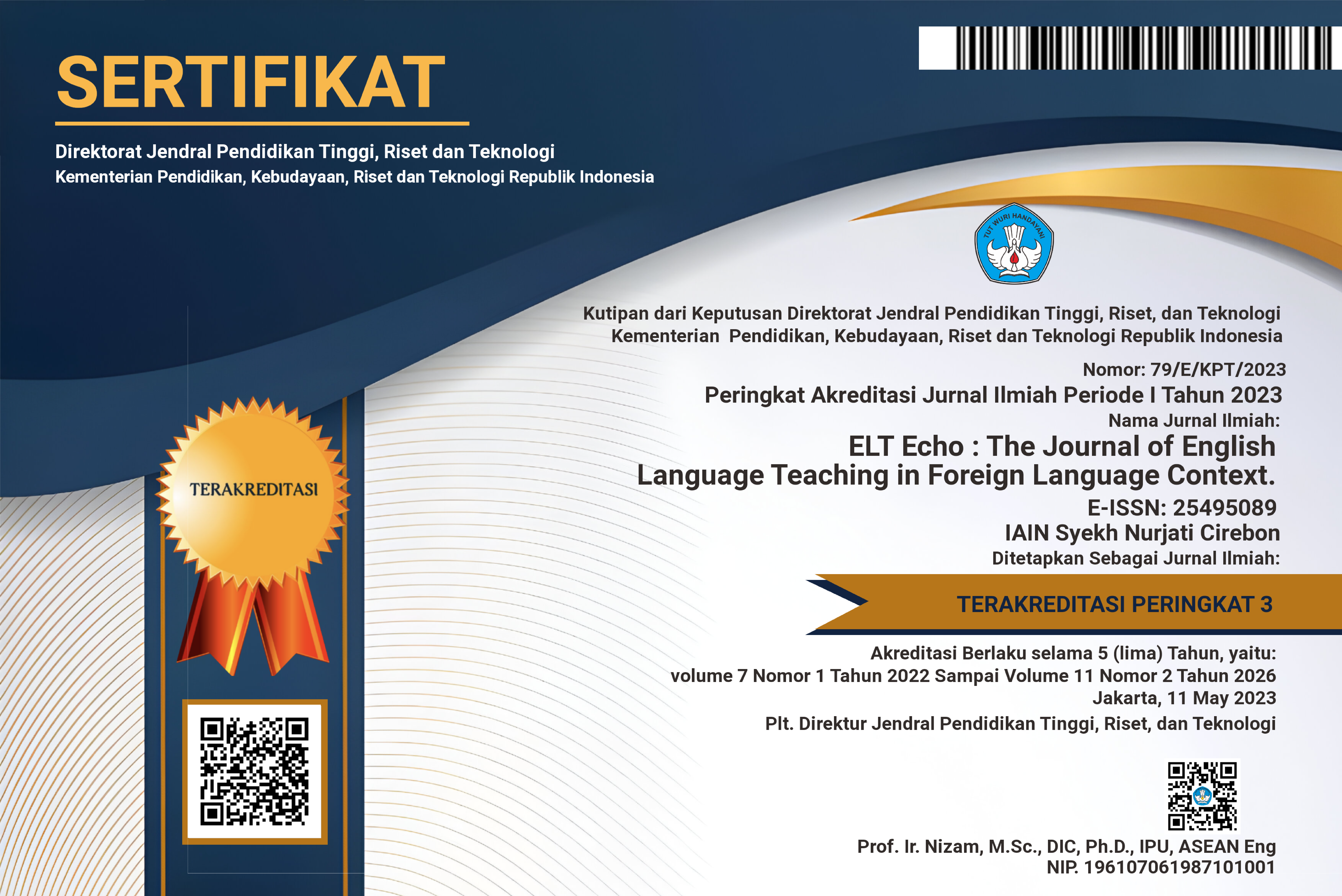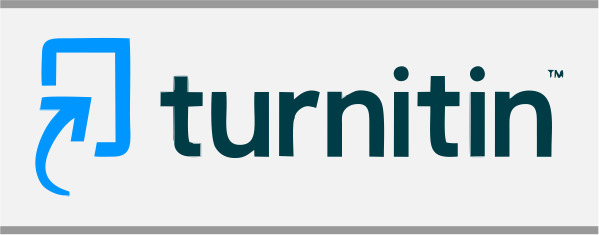Graduate Students' Perceptions on Their Metacognitive Awareness in Academic Writing
(1) I am an English Education Master Student graduated from Sanata Dharma University
(*) Corresponding Author
Abstract
Abstract: L2 academic writing processes require both cognitive and affective aspects from EFL University students to be more proficient and independent writers. Hence, metacognitive awareness plays a pivotal role to bridge the huge gap between cognitive and affective elements hindering graduate students to accomplish the given academic writing tasks. Further, this present study attempted to investigate graduate students’ perceptions of their metacognitive awareness in academic writing. To fulfill this study objective, this study was conducted qualitatively by utilizing the qualitative content analysis to provide more obvious portrayals out of the specific events experienced by the participants. Two research instruments were also harnessed in this study namely the Likert-scale Questionnaire and open-ended interview questions. The participants enrolling in this study were 15 English Education Master students of Sanata Dharma University, Yogyakarta having experienced academic writing learning journeys for one and a half years. The obtained findings delineated the importance of cultivating a higher degree of metacognitive awareness during academic writing learning enterprises to make EFL University students more competent, self-regulated, and qualified L2 academic writers. Although this study only contributed a small puzzle piece to complete the prior investigations on the importance of metacognitive awareness in academic writing learning rides, EFL practitioners and educators should foster learners’ metacognitive awareness at the onset of academic writing programs to enrich the development of their cognitive and affective state into the utmost level. Â
Keywords: metacognitive awareness, academic writing, graduate students
Keywords
Full Text:
PDFReferences
REFERENCES
Azizi, M., Nemati, A., & Estahbanati, N. (2017). Meta-cognitive awareness of writing strategy use among Iranian EFL learners and its impact on their writing performance. International Journal of English Language & Translation Studies, 5(1), 42-51.
Balta, E. E. (2018). The Relationships among Writing Skills, Writing Anxiety and Metacognitive Awareness. Journal of Education and Learning, 7(3), 233-241.
Briesmaster, M., & Etchegaray, P. (2017). Coherence and cohesion in EFL students' writing production: The impact of a metacognition-based intervention. Ãkala, revista de lenguaje y cultura, 22(2), 183-202.
Diliana, E. (2018). The Effectiveness of Peer Assessment to Teach Descriptive Writing for High and Low Proficiency Students: The Case at The English Department Students of Pancasakti University Tegal in The Academic Year of 2014/2015 (Doctoral dissertation, Diponegoro Universty).
Farahian, M., & Avarzamani, F. (2018). The impact of portfolio on EFL learners’ metacognition and writing performance. Cogent Education, 5(1), 1450918.
Flavell, J. H. (1979). Metacognition and cognitive monitoring: A new area of cognitive–developmental inquiry. American psychologist, 34(10), 906.
Forbes, K., & Fisher, L. (2018). The impact of expanding advanced level secondary school students' awareness and use of metacognitive learning strategies on confidence and proficiency in foreign language speaking skills. The Language Learning Journal, 46(2), 173-185.
Graham, S., & Harris, K. R. (2016). A path to better writing. The Reading Teacher, 69(4), 359-365.
Hacker, D. J., Keener, M. C., & Kircher, J. C. (2009). Writing is applied metacognition. Handbook of metacognition in education, 154-172.
Harris, K. R., Graham, S., Brindle, M., & Sandmel, K. (2009). Metacognition and children’s writing. Handbook of metacognition in education, 131-153.
Harris, K. R., Santangelo, T., & Graham, S. (2010). Metacognition and strategies instruction in writing. Metacognition, strategy use, and instruction, 226-256.
Hashemi, M. R., Behrooznia, S., & Mohaghegh Mahjoobi, F. (2014). A critical look into Iranian EFL university students’ critical thinking and argumentative writing. Iranian Journal of Applied Linguistics, 17(1), 71-92.
Krippendorff, K. (2004). Measuring the reliability of qualitative text analysis data. Quality and quantity, 38, 787-800.
Langford, S. (2015). Reflecting on revision: Student reflection and metacognitive awareness in the writing process. Studies in Teaching 2015 Research Digest, 61.
Maftoon, P., Birjandi, P., & Farahian, M. (2014). Investigating Iranian EFL learners’ writing metacognitive awareness. International Journal of Research Studies in Education, 3(5), 37-51.
McNamara, D. S., Crossley, S. A., & McCarthy, P. M. (2010). Linguistic features of writing quality. Written communication, 27(1), 57-86.
Negretti, R. (2012). Metacognition in student academic writing: A longitudinal study of metacognitive awareness and its relation to task perception, self-regulation, and evaluation of performance. Written Communication, 29(2), 142-179.
Nguyen, L. T. C., & Gu, Y. (2013). Strategy-based instruction: A learner-focused approach to developing learner autonomy. Language Teaching Research, 17(1), 9-30.
Ong, J. (2014). How do planning time and task conditions affect metacognitive processes of L2 writers? Journal of Second Language Writing, 23, 17-30.
Panahandeh, E., & Asl, S. E. (2014). The effect of planning and monitoring as metacognitive strategies on Iranian EFL learners’ argumentative writing accuracy. Procedia-Social and Behavioral Sciences, 98, 1409-1416.
Pradana, S. A. (2015). The Effect of English Short Story Reading Habit on Students’Ability in Writing Narrative Text. English Education: Jurnal Tadris Bahasa Inggris, 8(1), 17-38.
Qin, L. T., & Zhang, J. L. (2019). English as a foreign language writers’ metacognitive strategy knowledge of writing and their writing performance in multimedia environments. Journal of Writing Research, 12(2), 393-413.
Raoofi, S., Chan, S. H., Mukundan, J., & Rashid, S. M. (2014). Metacognition and Second/Foreign Language Learning. English Language Teaching, 7(1), 36-49.
Robson, S. (2010). Self-regulation and metacognition in young children's self-initiated play and reflective dialogue. International Journal of Early Years Education, 18(3), 227-241.
Ruan, Z. (2014). Metacognitive awareness of EFL student writers in a Chinese ELT context. Language Awareness, 23(1-2), 76-91.
Schraw, G. (2009). A conceptual analysis of five measures of metacognitive monitoring. Metacognition and learning, 4(1), 33-45.
Schraw, G., & Dennison, R. S. (1994). Assessing metacognitive awareness. Contemporary educational psychology, 19(4), 460-475.
Teng, F. (2016). Immediate and delayed effects of embedded metacognitive instruction on Chinese EFL students’ English writing and regulation of cognition. Thinking Skills and Creativity, 22, 289-302.
Teng, F. (2020). Tertiary-level students’ English writing performance and metacognitive awareness: A group metacognitive support perspective. Scandinavian Journal of Educational Research, 64(4), 551-568.
Thompson, L. E. I. G. H., & Cohen, T. R. (2012). Metacognition in teams and organizations. Social metacognition, 283-302.
Wei, X. (2020). Assessing the metacognitive awareness relevant to L1-to-L2 rhetorical transfer in L2 writing: The cases of Chinese EFL writers across proficiency levels. Assessing Writing, 44, 100452.
Winne, P. H., & Baker, R. S. (2013). The potentials of educational data mining for researching metacognition, motivation and self-regulated learning. JEDM| Journal of Educational Data Mining, 5(1), 1-8.
Wu, J. Y. (2014). Gender differences in online reading engagement, metacognitive strategies, navigation skills and reading literacy. Journal of Computer Assisted Learning, 30(3), 252-271.
Xinghua, L. (2010). An investigation of Chinese university EFL learners’ knowledge about writing. Language Studies Working Papers, 2, 51-63.
Yavani, Z. (2018). Improving Students’ Writing Skill Through Graphic Organizer in Process Writing. ELT Echo: The Journal of English Language Teaching in Foreign Language Context, 3(1), 77-87.
Yuliana, D., Imperiani, E. D., & Kurniawan, E. (2016). English writing skill analysis of first year Indonesian Tertiary Students in a University in Bandung. Jurnal Pendidikan Bahasa dan Sastra, 16(1), 43-57.
Zhang, L. J., & Zhang, D. (2013). Thinking metacognitively about metacognition in second and foreign language learning, teaching, and research: Toward a dynamic metacognitive systems perspective. Contemporary Foreign Languages Studies, 396(12), 111-121.
Zheng, L., Li, X., Zhang, X., & Sun, W. (2019). The effects of group metacognitive scaffolding on group metacognitive behaviors, group performance, and cognitive load in computer-supported collaborative learning. The Internet and Higher Education, 42, 13-24.
DOI: 10.24235/eltecho.v6i1.7957
Article Metrics
Abstract view : 20 timesPDF - 6 times
Refbacks
- There are currently no refbacks.
Â
This Journal is indexed by:
Â

This work is licensed under a Creative Commons Attribution 4.0 International License.










